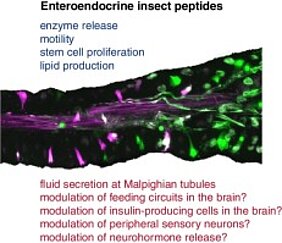New review on enteroendocrine peptides
06.11.2015Together with his collaborator Jan A. Veenstra from the University of Bordeaux, Christian Wegener wrote a review article on the chemical identity, function and regulation of enteroendocrine peptides in insects. Surprisingly, this seems to be the first review dedicated solely to insect enteroendocrine peptides.
Wegener C, Veenstra JA. 2015. Chemical identity, function and regulation of enteroendocrine peptides in insects. Current Opinion in Insect Science 11:8–13.
How animals allocate energy and metabolic decisions are coordinated is a fundamental physiological question. Metabolic research is strongly driven by an increasing obesity rate in humans. For insects — which contain many pest species and disease vectors — the control of feeding is of agroeconomical and medical importance. Regulatory peptides have since long been in focus of metabolic research. In insects, major advances have been made recently, mostly due to research in the genetically tractable Drosophila melanogaster with focus on the central nervous system as a source of neuropeptides. Research on peptides produced by enteroendocrine cells remained peripheral, but this situation is about to change. This review highlights current knowledge and advances on the identity and role of enteroendocrine insect peptides.









